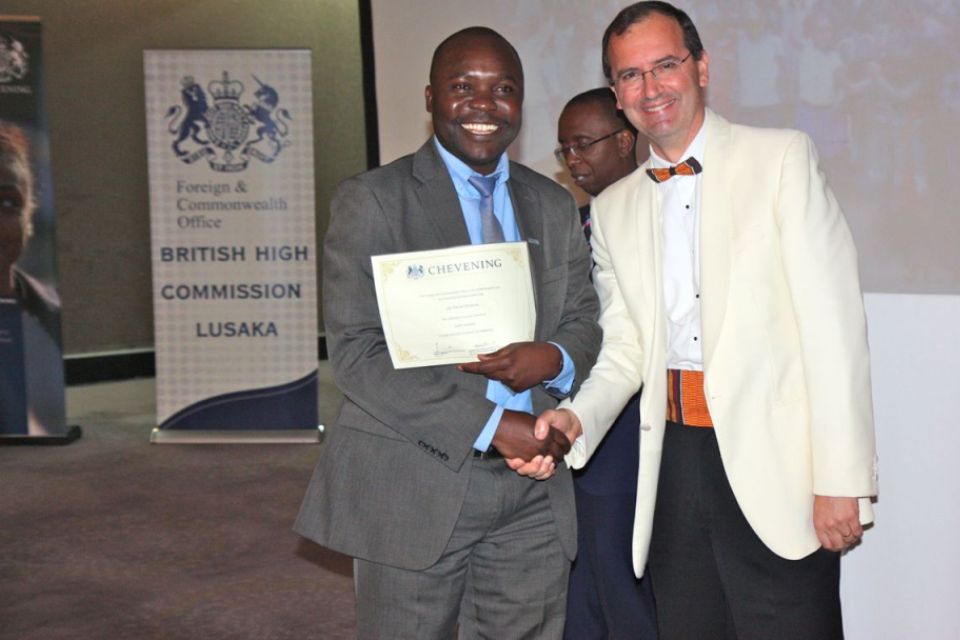British High Commissioner welcomes returning Zambian Chevening scholars
The British High Commissioner Fergus Cochrane-Dyet spoke at a reception in Lusaka for returning 17 Zambian Chevening scholars who studied in the UK.

Speaking at the event, which was also attended by the Zambian Minister of Higher Education Prof. Nkandu Luo, Mr Cochrane-Dyet said:
Welcome, and thank you for coming this evening.
I am delighted to be hosting this event to welcome the 17 Zambians who went to study at prestigious British universities. I also welcome the Chevening alumni who are already making a difference in Zambia through their respective positions and activities they are carrying out in their communities.
I am always interested when meeting Zambians who have studied and lived in the UK to find out how they coped with the cultural differences. Take British understatement, for example, and irony. Anyone going to Britain for the first time needs to know that when they hear someone preface a remark with “With the greatest respect” they do not mean “I think highly of you”, not at all, what they really mean is “I think you are completely wrong.” Or someone might respond to an observation you make by saying “how very interesting”. Do they really mean that they have been inspired by your sparkling intellect or do they actually mean that they think you have been talking nonsense? And if you hear a British person say “I agree with you up to a point”, be in no doubt that an accurate translation would be “I am too polite to say so but I think you might be mad”.
For many years now, the UK has been working alongside Zambia to develop young leaders and support the self-development of individuals who want to make positive change in their communities, workplaces and their country. The British High Commission aims to build lasting relationships between people in the UK and Zambia, and increase the appreciation of what the UK has to offer and what we have achieved - together.
Chevening and its predecessor schemes have been operating in Zambia since 1985. To date, over 230 Zambians have studied in the UK under it. Chevening is the UK’s flagship scholarship scheme administered in Zambia by the Association of Commonwealth Universities on behalf of the Foreign and Commonwealth Office. I hope to see more Zambians study in the UK, now that we have expanded our Chevening Scholarship scheme here from two places in 2015 to 17 in 2016. We are in the process of organising interviews for the scores of Zambians who have applied for Chevening scholarships in various fields of study for the 2017/2018 academic year. I wish them luck.
Chevening Scholarships are an important element of the British Government’s programme to promote greater capacity for the next generation of Zambian leaders and to further develop the excellent relationship between Zambia and the UK. Improved relations are in the interests of all of us. At the risk of flattering many of you, these Scholarships are for talented people who have been identified as potential future leaders across a wide range of fields, including politics, business, the media, civil society, religion, and academia.
Let me tell you a fact. Did you know that of all the kings and queens, presidents and prime ministers across the world, all those currently serving, one-in-seven of them have studied in the UK? Britain continues to offers among the best educational institutions in the world - schools as well as universities. And many influential Zambians have benefited from that experience. The idea of the Chevening scheme is to expand that further, two examples being Justice Florence Lengalenga, High Court Judge, and Chibamba Kanyama, former Zambia National Broadcasting Corporation Director General and now working for the International Monetary Fund.
I am certain that the 17 returning students will join the list of Zambian Chevening Alumni who are using their skills and knowledge to contribute significantly to Zambia’s development.
I am glad that the Alumni are doing some good works already. For instance, they contributed to Zambia’s elections last year by hosting a public debate for candidates who were vying for the Mayoral seat in Lusaka. Candidates, who included the current Mayor, Mr Wilson Kalumba, had the opportunity to sell themselves to the electorate. The Alumni also participated in the inaugural “Race to Beat Cancer” which was organised by PricewaterhouseCoopers Limited Zambia to raise awareness about the disease. You Alumni have helped to mentor and encourage potential candidates to apply for Chevening scholarships. You have also assisted with interviews for Chevening applicants. I look forward to seeing more of such activities, and would like to hear your ideas.
Finally, being educated at a British university can have unexpected rewards. I speak from experience. In 1983 I matriculated at Jesus College, Oxford University, but chose to leave after an unhappy affair of the heart. I went travelling instead, worked at a school in Kenya, and decided that I wanted to devote my life to working with Africa and Africans.
Subsequently, I returned to my studies at Durham University. However, after my unhappy experiences at Oxford, I chose an all-male college so that I could avoid women for a while and thus avoid romantic entanglements. What I did not know was that after I had been accepted, the college deviously decided to introduce women for the first time with an initial intake of twenty young ladies. Arriving at the college on that sunny October morning nearly 33 years ago, the first other student that I saw was an attractive girl in a blue beret. Ladies and gentlemen, that student’s name was Susie, and she became my wife shortly afterwards. An unexpected benefit from my university education.
Thank you for listening.
I would now like to conclude by presenting certificates to the returning scholars.